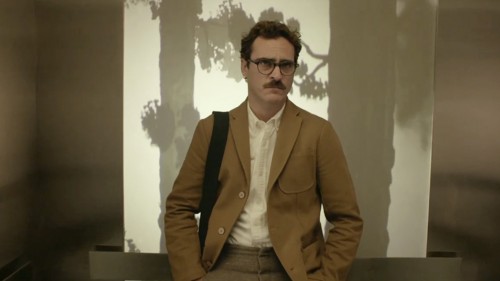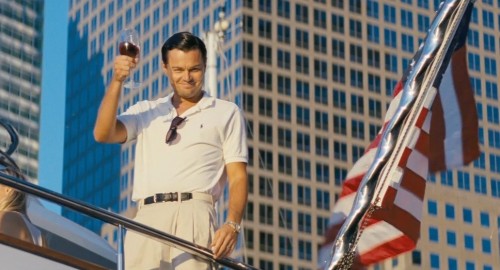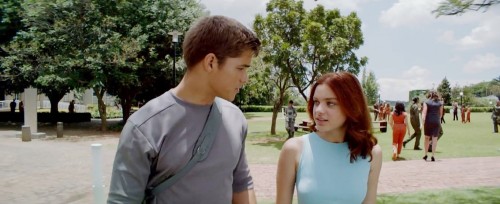By Greg Popil
As a society, or at least as the subset of society that enjoys websites about rock music and independent film, we can get caught up in lionizing the idea of “authenticity.” The notion that something is real, crafted, and genuinely labored upon, can be incredibly intoxicating, and make the finished product seem better somehow. But is it the work that went into a creation that makes it authentic, or the intensity of the feeling that the creation elicits once it is loosed upon the world?
Spike Jonze’s new movie “Her” weighs this question and fearlessly champions the latter opinion. Joaquin Phoenix, completely recovered from his idiotic pseudo-hiatus from acting, is fantastic as Theodore, a sad, lonely man who uses his computer to create “hand-written” letters for couples who want to express their love for each other. This is an absolutely perfect career choice for the character, something you could easily imagine hearing about and getting enraged over for a week before considering it a completely normal part of life. A lesser movie would make this job into a cheap gag, but Theodore is shown to be genuinely great at his job, and that attitude about the character extends into his relationship with Samantha, an operating system (or “OS”) with an artificial intelligence that allows her to be at once an ideal personal assistant and conversational companion (her personality is initially generated via a hilariously brief, Freudian questionnaire). This companionship quickly evolves into a deep, heartfelt friendship, and then something more.
The OS, who names herself Samantha, is played by the voice of Scarlett Johansson, in what may be the finest performance of her career. Her Samantha is bright, funny, curious and completely unwilling to be subservient or take any of Theodore’s crap. She is at once the epitome and a parody of what critic Nathan Rabin calls the Manic Pixie Dream Girl, a movie character who comes into a male protagonist’s life and completely changes his worldview with her super-happy awesomeness.
The most obvious comparison one can make to this movie’s premise is “Lars and the Real Girl,” in which Ryan Gosling attempted to convince his family that he was in a loving, committed relationship with a life-sized doll. But Jonze thankfully has a lot more in mind here. Unlike that movie, in which it was all but impossible to believe that Gosling was doing nothing more than projecting his own desires and personality onto his “girlfriend,” “Her” goes out of its way to show that Samantha is very much her own being, right down to her sometimes very profound questioning of her own existence and purpose in the universe. We as a culture have been lectured more times than I can count about our obsession with technology (right before I went to see this movie, in fact, I watched part of a “Modern Family” rerun with that very message), but “Her” plays the relationship totally straight. There are no judgmental laffs at what a loser Theodore is, nor do most people find the relationship to be anything but interesting and kind of beautiful.
The one exception to that non-judgmental attitude is Theodore’s ex-wife, played by Rooney Mara. Seemingly based on Jonze’s ex-wife Sofia Coppola (much in the way Coppola in no way based Giovanni Ribisi’s obnoxiously twee photographer in “Lost in Translation” on Jonze), Mara is the kind of actress that seems incapable of playing dumb, and her conversation with Theodore turns on a dime as she cuts right to the heart of his inability to connect with people, understanding implicitly why a non-human connection would be so much more appealing for him. The emotional fallout from this meeting, combined with a horrifyingly awkward sexual encounter set up by Samantha, show the first fissures in their relationship.
Had those scenes planted the seeds of the relationship’s end, the movie could have ended damn near flawlessly. But Theodore and Samantha survive that challenge, which leads to the movie’s main problem. Without getting too into spoilers, the plot takes a turn into Arthur C. Clarke territory, and Jonze, for all his visual talents as a director, does not seem to have his heart in this development as much as the rest of the movie. Like the criminally underrated “A.I.,” “Her” is attempting to tell a micro story at the edge of a larger one, focusing on a personal relationship that exists in the shadows of a revolution. This subplot feels somewhat shoehorned in, and distracts from the power of the central relationship by raising a bunch of larger questions that the film does not have time to examine, let alone answer. Phoenix and Johannson completely sell the development, and their final scene “together” is a complete gut punch, but it feels a tad unnecessary.
None of this, however, makes this any less of a film to go see. Jonze remains, even after the infamous burnout of filming “Where the Wild Things Are,” a fundamentally joyful filmmaker, and the happiness exuded by Theodore and Samantha is something to behold. It doesn’t always make sense, but what relationship does?
Rating: 70/81




Leave a Reply